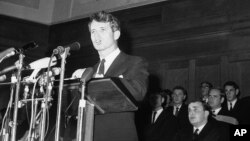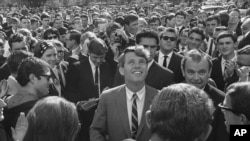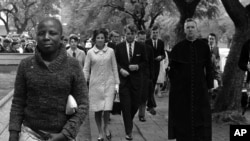In 1966, New York Senator Robert F. Kennedy made a historic visit to apartheid South Africa and gave what many scholars consider the best speech of his life.
“Each time a man stands up for an ideal‚ or acts to improve the lot of others‚ or strikes out against injustice‚ he sends forth a ripple of hope. And crossing each other from a million different centers of energy and daring, those ripples build a current which can sweep down the mightiest walls of oppression and resistance,” he told a crowd at the University of Cape Town.
Half a century later, on the anniversary of his visit, these words still resonate. That’s why Kennedy’s daughter, Kerry, a human-rights activist, is in South Africa this week, retracing her father’s steps along with a delegation of Kennedy family members.
To hear some analysts and politicians talk, South Africa is on a long, slow decline. The president is mired in scandal after scandal, the South African rand has tumbled in value, violent crime remains high, politicians have had actual scuffles in parliament not once, but twice this month.
But against this background, Kerry Kennedy says she’s optimistic. After all, she says, her father delivered his hopeful, defiant words in a very different South Africa. In 1966, the nation seemed concretely locked into the racist apartheid system. The powerful speeches he delivered over his four-day visit raised hopes that apartheid might one day end.
Change from below
Kennedy says that in her experience, change doesn’t come from above.
“All those changes took place not because governments wanted them to; governments tried to stop them,” she said this week at Johannesburg’s University of the Witwatersrand. “And not because militaries wanted them to; militaries tried to stop them. And not because huge multinational corporations wanted them to; multinational corporations tried to stop them, including South Africa…. All those changes took place because small groups of determined people harnessed the dream of freedom and made it come true. That’s what creates change.”
During his trip to South Africa, Robert Kennedy met with an anti-apartheid icon, Chief Albert Lutuli. The controversial and logistically difficult step captured media attention both in South Africa and in the U.S., which in turn increased American awareness of the plight of black South Africans under apartheid.
Kennedy's trip, linked as it was to his quest for civil rights in the U.S., also underscored the similarities between racist laws in both countries.
‘He made us feel… it was still worthwhile’
Black South African media at the time noted the impact of Kennedy’s words. One black journalist wrote: “He made us feel, more than ever, that it was still worthwhile, despite our great difficulties, for us to fight for the things that we believed in; that justice, freedom and equality for all men are things we should strive for, so that our children should have a better life."
Johannesburg mayoral candidate Herman Mashaba said this week that he sees that same optimistic, grassroots spirit in the people of the city today.
“I’ve seen a city that is falling apart at the seams, one that is constantly being re-stitched together by people who refuse to give up,” he said this week, announcing his candidacy. “It is these people that keep me going, people who despite having been given up on by the government, refuse to give up on themselves.”
That glimmer of hope is something that Robert F. Kennedy himself touched on in his final speech of the 1966 tour, delivered at the University of the Witwatersrand, in words that still ring true today:
“So tomorrow's South Africa will be different from today's – just as tomorrow's America will be different from the country I left these few short days ago,” he said. “Our choice is not whether change will come, but whether we can guide that change in the service of our ideals and toward a social order shaped to the needs of all our people.”
"In the long run we can master change not through force or fear, but only through the free work of an understanding mind – through an openness to new knowledge and fresh outlooks which can only strengthen the most fragile and the most powerful human gifts – the gift of reason,” Kennedy said.


